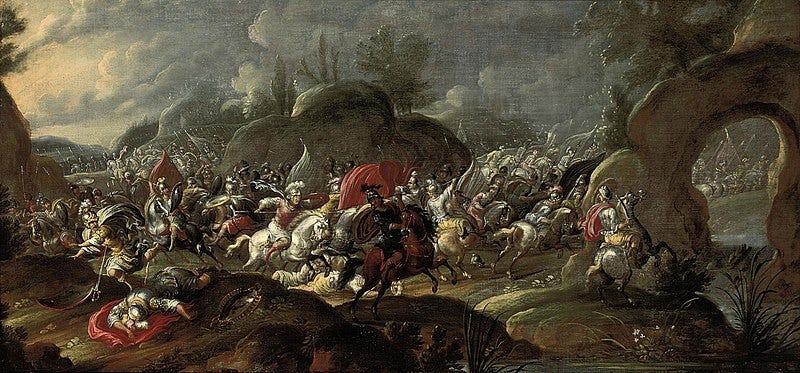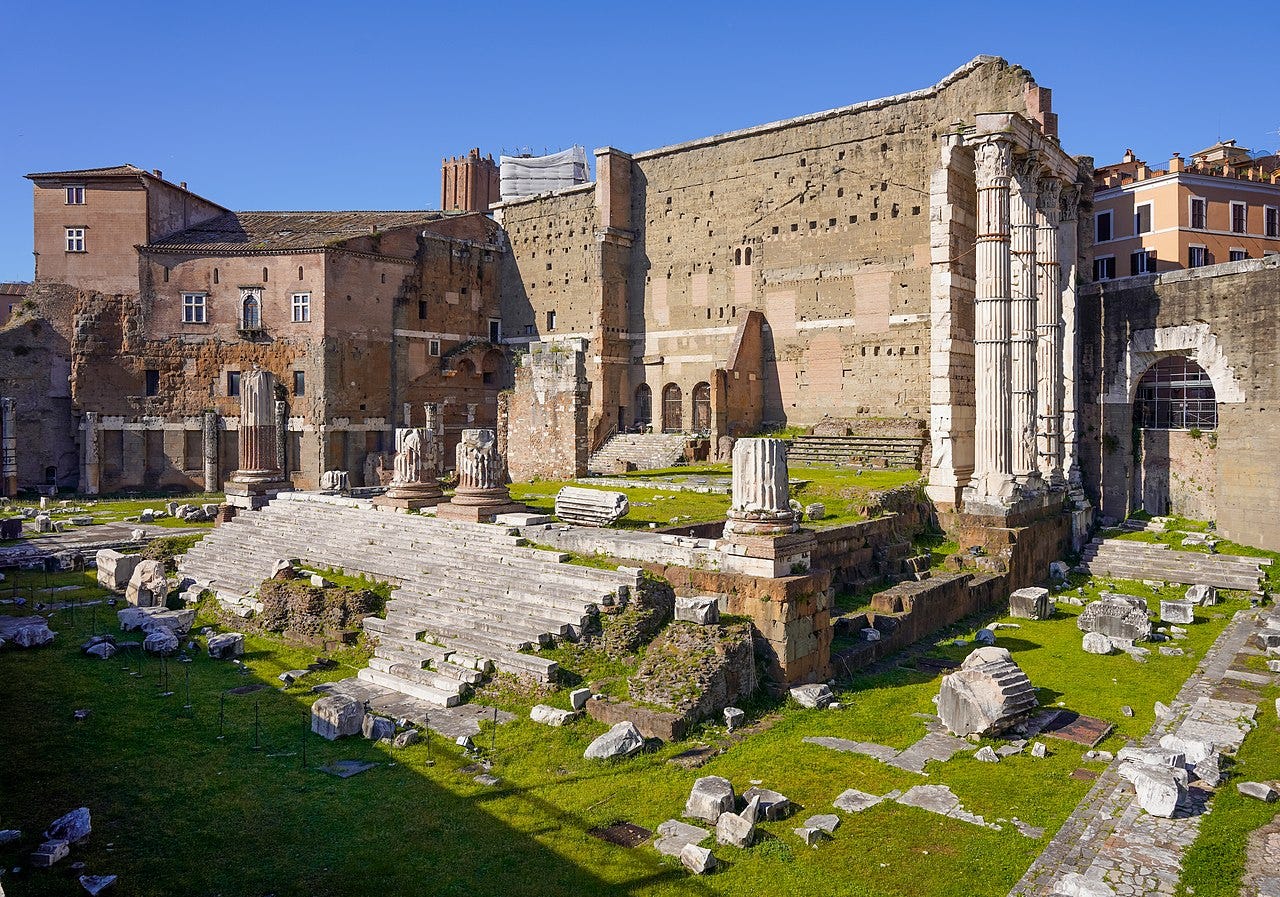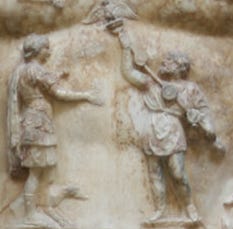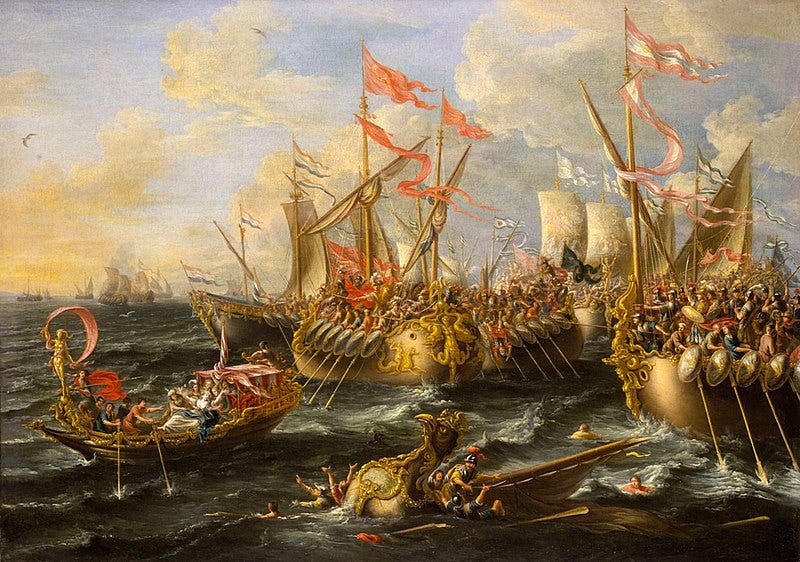Now we prefer to anticipate our enemies
rather than suffer at their hands—Appian’s version of the proscription decree, early 2nd c. AD
Before the battle of Philippi, which was to determine the fate of the Roman Republic, Octavius, Caesar’s adopted son, vowed that if he and Mark Antony were victorious against the ‘liberators’ Brutus and Cassius, he would build a temple in honor of Mars the Avenger.
Although the future emperor was ultimately victorious, it would be another 40 years before the temple was dedicated (though still incomplete) in 2 BC, on the Capitoline Hill in the Forum Augustus.
It has been speculated that the delay in the temple’s construction was due to the fact that Octavius did not want to flaunt his victory against a foe who was not only recognized by many in Rome as a liberator, but perhaps more importantly, was a fellow Roman.
The temple’s construction did not begin until the return of the aquilae, the military standards that were recovered from the Parthians in 20 BC, and when it was dedicated in 2 BC it honored instead Augustus’s 13th consulship, as well as his acceptance of the title Pater Patriae, “Father of the Fatherland.”
The issue of fratricide goes back to the founding of Rome. The brothers Romulus and Remus, having defeated their evil uncle and restored their grandfather to the throne of Alba Longa, set off to found their own city. They returned to the place where they were first abandoned as infants along the Tiber, to the woods that then blanketed the seven hills of Rome. Deciding where best to establish their city, Romulus preferred the Palatine Hill, while Remus the Aventine. The accounts of the story differ, but all agree that, in the end, Romulus killed his brother Remus.
So the story of the city’s founding is also the story of its first fratricide. There would be many more to come. The history of Rome is the history of brother waging war against brother. Plebs against patricians, Gracchi against the Senate, Sulla and Marius, Pompey and Caesar, Octavian and Antony.
The spirit of vengeance to which the temple was dedicated was perhaps too apt. The murder of Caesar precipitated the proscriptions of the second triumvirate, as well as the bloodiest battle of any civil war in the history of Rome, the Battle of Philippi. Caesar was avenged in a manner befitting the spirit of Rome itself: that of brother against brother.

Caesar Ultor
Now the great line of centuries begins again.
See where strife has brought our unhappy citizens.
Divine justice returns. The reign of Saturn returns.
Snarling with spit, the people like hounds, like Cerberus
guarding the way out of hell. The yellow-eyed ravening howl
makes of the rostra a damnable pit, and the senate a cell.
They riot for grain, their numbers swell in spring,
like breakers eroding cliffs that ebb at eventide.
They crash and go, but eat away the stone bit by bit.
And while the augurs watch their birds, and men their empires,
the titans, decreated in the underworld, suckle the black
and grow back limbs. Their blood runs hot, and they hunger.
Caesar’s reborn as vengeance, the curse of fratricide
whence the great hubris of the City, its birth pangs raw
as from the first day, when brother struck brother.
Now a fell storm swallows the sails of Brundisium.
Dry thunder, and hot seabreeze that immiserates.
The shore slips from its power and gives up all its graves.
Their names are pricked, their heads are piked. The Tiber chokes
on headless bodies (whom they knew) heaved into its throat
that shatter the mirror, and peace, of the rippling moonlight.
And on a waste in Greece, a hundred thousand brothers die
by their brothers’ hands, so many Earth cannot receive the sum.
And more are swallowed by the waters of Sicily and Actium.
So the City’s founding for all its days is acted out
and its fall shall be the final acting of it out.
Into its stone is baked the blood of many Remuses.
The thing that made them great would be their undoing.
They’d failed to learn that from the Greeks, as who can?
Though they admired them, they did not understand.
After cruelty’s exhausted, there’s work to be done.
The City made of bricks must be clothed in marble.
After decimation, a formal feeling comes.
He wins over soldiers with gifts, with cheap corn
the populace, and all men, grown numb, accept
the sweets of repose like foes resigned in disgrace.
He grows greater by degrees while he concentrates
in himself the functions of the Senate and magistrates,
and pries from his brother’s hands the whole weary State.Some other poems in the series so far:
“The Ritual Sacrifice of Caesar” - On Caesar’s assassination
“Caesar Triumphator” - As a god, ruminating on the order he’s created
“Capo the Aquari” - On getting by in the Empire
“The Sibyl Hands Superbus the Books” - The voice of the Sibyl casts a warning
“SPQR” - on the bodies of the State
“Civitas” - On the sentiments of the optimates and the populares
“Vixerunt” - On the fate of the Cataline conspirators
“The Coming of Caesar” - Heroic, galloping dactyls on the omens foreboding Caesar
“Populus” - On Caesar’s political victory over Cato
“Res Publica” - On the decay of the State
“Veni Vidi Vici” - On Caesar’s 10+ years of military ascension







"After decimation, a formal feeling comes." That is a very fine line, flat and American-sounding. With the sculptural quality of your mind, these Roman studies suit you perfectly. You seem to work in marble and stone, not words. That won't always do, as you realize, and one of your great strengths (you have several, in my opinion) is your ability to choose subject matter that suits the temper of your imagination and its lingual contours. Lord, I'm high-falutin'!
Even with what happened to Brutus in the end, I still respect his rhetoric starting with "Friends, Romans, Countrymen! Lend me your ears!"